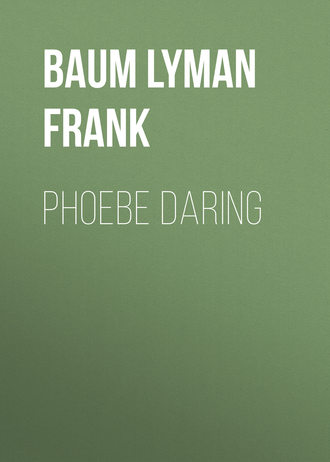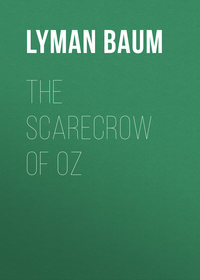 полная версия
полная версияPhoebe Daring
One evening Eric Spaythe called on Phoebe and they had a long talk about Toby Clark’s affairs.
“Hasn’t Mr. Holbrook done anything yet?” asked Phoebe impatiently.
“No; and I’ve an idea he doesn’t intend to do anything,” replied Eric.
“What makes you think that?”
“The way he acts. He’s letting things drag terribly. I don’t understand Holbrook, and that’s a fact. The time for prompt action was right after the robbery,” declared Eric. “Then everything was fresh and the trails were clear. It wouldn’t have been any trick at all to catch the thief then; but nearly a month has gone by and not a clew uncovered. We’re as far from the truth as ever.”
“Mr. Holbrook can hardly afford to make a failure of the case,” said Phoebe, using the well-worn argument doubtfully.
“It appeared to me that way, at first, especially as he seemed so cocksure of himself,” returned young Spaythe. “But he once made a remark to father that I’ve not forgotten. He said his reputation would be injured unless Toby Clark’s guilt was proved or – he found the guilty party. I don’t like that alternative, Phoebe. Do you know, I’ve an idea that Holbrook believes Toby is guilty?”
“I’ve had that idea from the first,” declared Phoebe with eagerness. “I was in his office when your father came to him with the news of Toby’s arrest, and I watched Mr. Holbrook carefully. Even at that time I could see he doubted Toby’s innocence, or else – or else – ”
“Or else what, Phoebe?”
“Or else he knows who took the box and is willing to have Toby accused.”
Eric stared at her wonderingly.
“That’s a good deal to accuse the fellow of,” he said. “I think our first guess is right, and in that event Toby is in a bad way. If Holbrook believes him guilty he won’t make any honest effort to find out who took the box. He’ll just let Kellogg prove his case. Then Holbrook will say he did the best he could but that no one could clear a guilty person. Most people will accept that sort of a statement and Holbrook may be depending upon it to save himself. That’s why he’s putting us off and taking things easy.”
“But they can’t prove Toby guilty!” protested Phoebe, who knowing in her heart the boy was innocent, had clung to the belief as her best anchorage.
“I’m not sure of that,” said Eric, gravely shaking his head. “It’s pretty strong evidence, Phoebe, and I don’t believe it’s safe to let the case go to trial just as it stands.”
“Then what can we do?” she asked helplessly.
Eric laughed.
“You know how to put a poser,” said he. “I’ve wondered many times what could be done, but for my part I can’t do anything. I’m tied down to the bank so closely that I haven’t a minute to devote to Toby, much as I long to help him. One or two evenings I’ve stayed at home and talked with Toby, but he’s as much bewildered by the thing as we are. The fact is, something’s got to be discovered. We can talk till we’re blind, but unless we know more than we do now it won’t amount to anything. Here’s the situation: Toby didn’t take Mrs. Ritchie’s box, but who did?”
“Ah, that’s the question!” said Phoebe.
“Yes, that’s the question – that and nothing else – and unless we can find an answer to it poor Toby is likely to suffer for another’s crime.”
This conversation rendered the girl very unhappy. She had previously been content to leave Toby’s salvation to the direction of Mr. Spaythe and Mr. Holbrook and she had not been especially uneasy over the outcome of the affair. But Eric had destroyed her confidence in the lawyer, and Mr. Spaythe was so silent and reserved that it appeared he was not taking any active part in Toby’s defense. In fact, nothing was being done to save Toby, and Phoebe told Cousin Judith that she was getting very anxious about the poor boy’s fate.
“That is not strange, dear, for I have been anxious from the very beginning,” confessed Judith. “I believe that for some reason there is a conspiracy afoot to destroy Toby Clark, and that it is likely to succeed.”
“Then,” retorted Phoebe, with one of her sudden decisions, “we must organize a counter-conspiracy to save him. We’ve been idle long enough, Cousin Judith – too long, I fear – and it’s time for us to act.”
“To whom do you refer when you say ‘us’!” asked the Little Mother, smiling at the girl’s earnestness.
“To you and to myself, of course.”
“I fear I am not a good conspirator, Phoebe; though you, I admit, seem qualified to be one. But what may two weak, inexperienced girls do, where a powerful banker and a clever lawyer fail?”
“We can do lots,” asserted Phoebe. “I can’t say just what, until I’ve thought it over; but oughtn’t the right to triumph, Cousin Judith!”
“It ought to, Phoebe, but I fear the right is sometimes smothered in false evidence.”
“It mustn’t be this time,” declared the girl. “We must try to save Toby. You think it over carefully, Cousin, and so will I, and perhaps one or the other of us will evolve an idea.”
Judith agreed to this, but added:
“I’ll not be an active conspirator, dear, but the conspirator’s assistant. I’ll help all I can, but I fear my talent for penetrating mysteries is not so well developed as your own.”
Phoebe went to her own room and sat down at her desk to think. She realized that she could not expect much energetic assistance from Cousin Judith and that whatever was accomplished she must undertake single-handed.
“I wish Phil was here,” she reflected, referring to her twin brother; “he’d know just how to tackle this problem.”
As a matter of fact Phoebe was far more resourceful than Phil, who had always come to his sister for advice in every difficulty. But she did not realize this.
“I wonder why Mr. Holbrook refused to have a detective?” she mused. “Was he so sure of his own ability to unravel the mystery, or – was he afraid?”
She jumped up and paced the room in sudden agitation. Then she controlled herself and sat down again.
“This won’t do!” she exclaimed, taking herself to task. “Unless I can consider everything calmly I shall deceive myself and start along the wrong road.” She took a pencil and sheet of paper and continued, talking to herself in an argumentative way: “Let’s marshal the facts. First, Mrs. Ritchie’s box is stolen. That’s a hard fact; you can’t get around it. In that box was a lot of money, some bonds as good as cash and other papers only valuable to their owner. The box was stolen for the money and bonds; fact number two. Whoever stole it from Judge Ferguson’s cupboard either had a key or picked the lock; anyhow the cupboard was found locked and the box gone. Yet no one but Judge Ferguson was supposed to have the key. Whoever it was that wanted the money, he or she had no key to the box itself and couldn’t pick the lock; so he or she had to carry away the box. That’s the third fact.
“Now, then, having got the box safely away, the thief broke it open, took the money and bonds, and then wondered what to do with the rest of the junk. He must get rid of all telltale evidence, somehow or other, so he took the box to the river, perhaps thinking to drown it. Perhaps he saw Toby’s shanty and decided to put the blame on him; that would throw the police on a false track. That was clever. Fact number – No! that isn’t really a fact; it’s just a surmise. No, if Toby is innocent it must be a fact. I’ll call it so – Fact number four.”
She jotted it down.
“Now let’s see where we are at,” she continued. “Thief has the money safe; police on a false track arrest Toby. Well, that’s as far as I can go on that line. Now, the important question is, who is the thief? First we must consider who knew about the box and that it contained money. Toby knew, of course, and Judge Ferguson. But who else? Mrs. Ritchie, but – Never mind; I’ll put her on the list. Janet knew; she couldn’t steal it but I’ll add her to the list. If I’m going to find out anything I must be thorough. I think Mr. Spaythe knew. I must ask him. Meantime, here he goes on the list. I wonder if Mr. Holbrook knew about the money? Not at first, but – Yes, I remember Janet told me that Toby took Mrs. Ritchie away, when she came to the house, and they went to ask Mr. Holbrook if it was lawful to give her the box. Of course the woman blabbed what was in it, and so – Mr. Holbrook knew. The theft was committed on the day or the night following the judge’s death, so that lets Mr. Holbrook into the game. Down he goes on the list. Who else? There’s Will Chandler, the postmaster; but perhaps he didn’t know. He owns the building and kept the judge’s key to the office. Will Chandler might have known there was money in the Ritchie box, so I’ll put the dear old boy under suspicion. Who else?”
She reflected long and deeply, but could not think of another person likely to know the location of the box and that it contained money. She considered Lawyer Kellogg, but knew that he and Judge Ferguson had been open enemies and that Kellogg had not been consulted by Mrs. Ritchie until after the loss of the box was a matter of public knowledge. So she reviewed her list: Mrs. Ritchie; Janet Ferguson; Mr. Spaythe; Mr. Holbrook; Will Chandler.
“Why, it’s nonsense!” she gasped in astonishment. “They’re every one impossible. I – I must start another line of discovery.”
But, try as she would, she could not get away from that list of obvious innocents.
“Unless some one knew the box was there, and that it contained money – enough to make it worth stealing – he couldn’t possibly have stolen it,” she told herself. “The list is all right, as far as it goes; but – is it complete?”
After more thought she put on her things and walked to Mr. Spaythe’s residence. Of course Toby was there, for he seldom if ever went out, and she promptly interviewed him.
“Who knew that Mrs. Ritchie’s box was in the cupboard, and that there was a good deal of money in it?” she demanded.
“What’s up, Phoebe?” he asked.
“I’m trying to sift this thing on my own account, and in secret, Toby,” she replied. “I want you to help me – just as if I were Sherlock Holmes or Monsieur Lecoq. Don’t ask questions; just answer them. Who knew?”
“I knew,” said Toby, with a grin.
“But I’m going to leave you out of it,” she replied. “This is an investigation to prove your innocence, so I don’t want any evidence against you.”
“You can’t do it, Phoebe,” said the boy. “Don’t bother about me; I’m not worth it. Let Holbrook do as he pleases.”
“What do you mean by that?” she demanded.
“He isn’t very anxious to clear me,” said Toby, looking at her with a queer expression. “I don’t know why; I only know that if I were a lawyer and had such a case I’d stir things up and find out the truth.”
“I think you would,” replied the girl. “It’s because Mr. Holbrook is so inactive that I’ve determined to take up the investigation myself.”
“It’s nice of you, Phoebe; but, say – a girl can’t do much. There’s something queer about the whole affair. I know something of law and also I ought to be able to guess who took the box; but it’s entirely beyond me. I can’t investigate it myself, and so – ”
“And so I’m going to do it for you,” she said. “My being a girl is no handicap at all, Toby. What we all want is the truth, and if I can discover that, you will be saved. Now, then, who knew about the box?”
“Mr. Spaythe,” said the boy.
“Why should he know?”
“He was the closest friend Judge Ferguson had. They were together a good deal and the judge used to tell all his affairs to his friend. I once heard him say, jokingly, that he was a rival banker, for Mrs. Ritchie deposited all her money with him. Mr. Spaythe asked where he kept it, and when the judge told him he said it was foolish to trust to oak doors and a tin box when the bank vault was fire and burglar proof.”
“Very well; who else knew?” asked Phoebe.
“Will Chandler, and Griggs the carpenter.”
“Oh!” cried Phoebe, scenting a clew at last. “Griggs knew, did he? Tell me how that happened.”
“The cupboard doors stuck, a few months ago, and wouldn’t shut properly. So the judge called up Will Chandler, who was his landlord, and asked him to fix the doors. Will looked at them and said the building must have settled a little, to make the doors bind that way, and the best plan would be to plane off the tops of them. So he got Griggs the carpenter and they took the doors off the hinges and planed them. While Griggs was working and Chandler helping him, in came Mrs. Ritchie and wanted fifty dollars. The judge took down her box and put it on the table and took out the money. I noticed both the men were surprised to see the box half full of bank bills and gold, for they couldn’t help seeing it; but they said nothing and when I mentioned it to the judge, afterward, he said they were both honest as the day is long, and he could trust them.”
“Do you think they are honest, Toby – both of ’em?”
“Yes.”
“Well, who else knew?”
Toby considered.
“Mr. Holbrook, of course. The night I took Mrs. Ritchie to see him she said there was currency to the amount of several thousand dollars in the box, besides a lot of bonds.”
“Was that before the box was stolen?” asked Phoebe.
“I don’t know. I haven’t seen the inside of the cupboard since a few days before Judge Ferguson died. I can’t tell when the box was stolen.”
“But the loss wasn’t discovered until after Mr. Holbrook had talked with Mrs. Ritchie?”
“No. I think Mr. Spaythe discovered that the box was missing some days afterward.”
“Tell me who else knew.”
“I can’t. Mrs. Ritchie might have told some one, of course; but she’s usually too shrewd to do that. Judge Ferguson didn’t talk about his business.”
Phoebe referred to her list. The interview with Toby had netted just one addition – Griggs the carpenter.
“There was Mrs. Miller, the woman who used to wash the office windows,” said Toby reflectively.
“But she’s deaf and dumb,” returned Phoebe.
“She isn’t blind, though. She’s washed the windows and cleaned the offices every Saturday for years, and Saturday was Mrs. Ritchie’s usual day for driving to town. I can’t remember that Mrs. Miller has ever seen the box opened, but she might have done so.”
Phoebe added Mrs. Miller’s name to the list.
“The next thing I want to know is who visited Judge Ferguson’s office the day after he died,” she said.
“I can’t help you much in that,” said Toby. “I went there in the morning, because I didn’t know where else to go; but no one came in – except Will Chandler and Mr. Holbrook.”
“Oh; they were there, then. And why?”
“They came together, because Mr. Holbrook wanted to see the offices. He rented them that very day, I understand. Will told me that Janet wanted me, so I went away and left them there. Will had the key, you know.”
“This is news,” said Phoebe, drawing a long breath.
Toby smiled. “You’re not suspecting them, I hope?” he said.
“I’m not suspecting anybody, as yet. All I want at present are the facts in the case. I suppose no one else had a key to the office?”
“No. That very day Mr. Holbrook advised Will to give his key to Mr. Spaythe, and he advised me to get rid of my key, also. Will sent his key to the bank by Mr. Holbrook, who was going that way, but I went back and got my books and traps out of the office before I brought the key here to this house and gave it to Mr. Spaythe.”
“Was it a very complicated lock?”
“The one on the office door? No. It was a common lock and that on the cupboard wasn’t much better. But the boxes all had better locks, that couldn’t be easily picked.”
“All right. I’m going now, Toby, but I may be back for more information. Keep your courage; I’m sure we shall get at the truth in time.”
But the boy, looking after her, shook his head and sighed.
“She’ll never suspect the truth,” he muttered. “No one will ever suspect, except those who know; and those who know will never tell.”
CHAPTER IX
HOW PHOEBE PLAYED DETECTIVE
On her way home Phoebe Daring stopped at the post office and talked with Will Chandler. He was a middle-aged man, slow and deliberate in thought and action, yet a veritable potentate in local politics and all affairs of a public character in Riverdale. There had been Chandlers in the town ever since it had been established, and before it had been named Riverdale it had been called Chandler’s Crossing, the original Chandler having been a ferryman on the river. This Will Chandler, the sole representative of a long and prominent line, was a steady, straightforward fellow and greatly respected by everyone. It was said that he was too honest ever to become rich, and to eke out a living for a large family he kept a little stock of stationery for sale in the post office. This was located in the front part of the room, and his daughter, a white-faced, silent girl, waited on customers and gave out the mail when her father was absent.
The postmaster was on his stool behind the wicket when Phoebe approached him.
“Who do you think could have taken Mrs. Ritchie’s box?” asked the girl.
“I don’t know,” said Chandler. “If I did, I’d help Toby out of his trouble.”
“I didn’t ask who took the box,” said Phoebe; “but who could have taken it.”
The postmaster slowly revolved this in his mind.
“Possible burglar?” he asked.
“Yes.”
“Sam Parsons, the constable.”
“How is that?”
“I went upstairs about noon and found Sam peeking through the keyhole into the judge’s office. He mumbled some and went away. That night, just before I went home to supper, I walked upstairs again, just to see if everything was all right. I hadn’t any key, that time, but Parsons was standing with his back to the door, silent like, as if he was thinking.”
“Rather curious, isn’t it?” asked Phoebe, quite astonished by this report.
“Can’t say,” replied Chandler. “I’d trust Sam with all I’ve got – even with the United States mail. He’s the squarest man that ever walked.”
“I think so, too,” she agreed. “What other possible burglar do you know of?”
Chandler pondered.
“I might have done it,” said he; “but I guess I didn’t. Toby might have done it; but I guess he didn’t. Holbrook might have done it; but I guess – ”
“Had Mr. Holbrook any chance to take the box?” she asked quickly.
“A chance, but a rather slim one. I took him up to see the office and while we were there Hazel called me for something. So I left him sizing up the furniture and law books, to see if they were worth buying, and came down to the office. When I got back Holbrook was sitting down, looking through the books. That was the only chance he had, as far as I know, and I’ll swear he didn’t have the box when I locked up and we went away.”
“You didn’t see Mrs. Miller around that day?”
“No.”
“Nor Griggs the carpenter?”
“Haw-haw! Phoebe; that’s funny. Griggs? Griggs steal the box? Why, the old idiot won’t take the money he earns, unless you force it on him. If there’s a soul in this world that don’t care a snap for money, it’s old Griggs.”
“Thank you, Mr. Chandler. Please don’t tell anyone I’ve been questioning you.”
He looked at her steadily.
“I suppose you’re Toby’s friend, because he once helped your people out of a scrape, as everybody knows – that time the Darings came near losing their money. I wish, Phoebe Daring, you could find out who took that box. I’ve been just miserable over Toby’s arrest; but I’m so busy here, just now, I can’t lift a finger to help him.”
The girl walked thoughtfully home, wondering if she had really accomplished anything. Sitting down at her desk she made the following memoranda, writing it neatly and carefully:
“THOSE WHO KNEW OF THE BOX“1. – Janet Ferguson. – Being the judge’s daughter and likely to suffer more than anyone else by the theft of the box, which the Ferguson estate was responsible for, and being a sweet and honest girl and incapable of stealing even a pin, Janet is beyond suspicion.
“2. – Mrs. Ritchie. – She knew better than anyone else the value of the box. A hard, shrewd old woman, very selfish and mean. It is said she half starves the workmen on her farm and makes her hired girl pay for the dishes she breaks. Her husband left her a good deal of money, and she has made more, so she is quite rich. Never spends anything.
“Question: Did Mrs. Ritchie steal her own box?
“Answer: She might be capable of doing it and then throwing the blame on Toby. Her eagerness to have the box given up to her as soon as she heard of the judge’s death looks suspicious. On the other hand she couldn’t pick a lock to save her neck, and it’s easy to trace her every movement from the time she drove into town until she went home again. She afterward went to Mr. Spaythe and bothered him until he decided to give her the box a day earlier than he planned to give the other boxes up to their owners. But when they went to the office and opened the cupboard, the box was gone. She nearly had a fit and called Mr. Spaythe a thief to his face. Don’t think she is clever enough to assume all that. She afterward went to Lawyer Kellogg, whom she hates, and employed him to help her find the thief. If she had stolen the box herself she wouldn’t have done that. She’d have kept quiet and obliged the Fergusons to make good any loss she claimed. Considering all this, I don’t believe that Mrs. Ritchie stole her own box.
“3. – Mr. Spaythe. – A rich man who likes to make more money. Gets all the interest he can and doesn’t spend much. Pays his son Eric a mighty small salary; people say it’s because he’s so stingy. He was Judge Ferguson’s best friend. Stern and severe to most people. His own son fears him.
“Question: Did Mr. Spaythe steal Mrs. Ritchie’s box?
“Answer: He had the keys and could have done so. We’re not sure the box was taken the day after the judge’s death; it might have been several days later. It is astonishing that Mr. Spaythe at once defended Toby; was much excited over his arrest; put himself out to go to Bayport to give five thousand dollars bail, and then took Toby into his own home. Mr. Spaythe isn’t usually charitable or considerate of others; he has known Toby Clark for years and has never taken any interest in him till now. Why has he changed so suddenly? Is it because he himself stole the box but doesn’t want an innocent boy to suffer for it? No answer just now. Better watch Mr. Spaythe. He’s the biggest man around here and considered very honorable. Always keeps his word religiously. Is trusted with everyone’s money. Can I suspect such a man? Yes. Somebody stole that box. I’ll put Mr. Spaythe under suspicion.
“4. – Will Chandler. – A prominent citizen, postmaster for a good many years and generally liked. Under bonds to the post-office department, so he has to be honest. No Chandler has ever done anything wrong.
“Question: Did Will Chandler steal the box?
“Answer: Not likely. He could have done so, but the same chance has existed for a long time, as far as Chandler is concerned, for the judge trusted him with his key. This key always hung on a peg just inside the post-office window, where the judge could reach it from the outside without bothering Chandler; but very few people knew that and either Will or his daughter Hazel always had the key in plain sight. Chandler had learned that there was money in Mrs. Ritchie’s box. He may have been suddenly tempted. Better put him under suspicion.
“5. – John Holbrook. – Absolutely unknown here. No record of his past. Is a lawyer and has a certificate to practice in this state. Dresses extravagantly, lives at the hotel and claims to be too poor to hire a clerk.
“Question: Did he steal Mrs. Ritchie’s box?
“Answer: This man, having little or no money, was audacious enough to open a law office here – ‘on his nerve,’ Don would say. Boldness is therefore a trait in his character. He suddenly learned, from the woman herself, that there was considerable money in her box. He told Toby not to give it up, which was quite right and good advice. But he had all that night to work in. Had been in the office – left alone there – and if he was observing had noticed that the locks of the door and of the cupboard were not hard to pick. Says he knows a lot about criminal practices and so he might have taken a wax impression of the keyholes and made keys to fit them. I’ve read of such things being done. Holbrook might have hidden the box in Toby’s rubbish heap and put the papers in his room without knowing who lived in the shanty. Was evidently disturbed by the news of Toby’s arrest. Took his case, but hasn’t done a single thing to clear up the mystery. Didn’t want a detective to come here. Why? Easy to guess, if Mr. Holbrook is guilty. All his acts are strongly suspicious. Keep a sharp eye on him.









